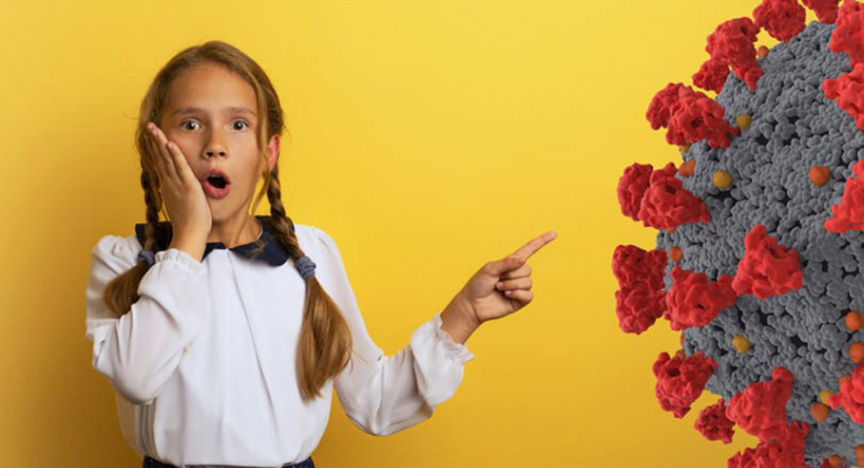
In this ever changing ‘new normal’ of outbreaks, lockdowns and social restrictions the COVID-19 pandemic has created, it’s not surprising that people are experiencing some stress and anxiety. And that’s just the grown-ups! Many parents are wondering what they can be doing to help their children stay calm and not worry too much, at a time when nothing about their day feels ‘normal’. Try these tips for talking with young children about COVID-19 to help them make sense of all the changes.
Even if you’ve tried to keep your kids away from the news and adult conversations, now that schools, restaurants, cinemas and even playgrounds are closed, they’re bound to be a little curious – and maybe even anxious.
Here are some tips for talking with young children about COVID-19 and the SARS-Cov-2 coronavirus and helping them cope over the coming weeks.
- Follow your child’s lead. Some kids will have lots of questions, while others are not that interested. Either way is fine – don’t offer more detail than your child is asking for.
- Find out what your child already knows. Ask questions that suit their age. For example, ‘Are your friends talking about the sickness that’s going around?’
- Listen for clues about how your child is feeling. They may be feeling worried, scared, confused or angry – these are all normal reactions to unusual events. This is a great chance to teach your child that it’s okay to have ‘big feelings’, and to talk about them.
- Be honest and provide the facts in language and a level of detail that suits their age. If they ask a question and you don’t know the answer, find out together. This handy book (available in multiple languages) by www.mindheart.co explains coronavirus simply for children under 7 years.
- Limit the amount of media coverage your children, see, hear and read. Young children can be distressed by the emotion in a media report even if they don’t understand the content. Stay informed with reliable information, so you can answer questions calmly and shape the way information reaches your child. If your children do watch the news, be there to explain it to them
- Provide some perspective. It’s important your child understands that not everyone is going to get sick with COVID-19 – and most people who do will only have mild or moderate symptoms including a fever and a cough. So far, only about one percent of confirmed cases internationally have been children, and they tend to have less severe illness than adults. Help your child understand that getting sick, and getting better again, is a normal part of life.
- Focus on the positives. Talk about all the good things that are happening to keep people safe and healthy. Let children know there are plenty of doctors and nurses working to help sick people get better, and lots of scientists working to find a cure. Be sure to point out all the ways that families, friends and neighbours are helping each other, spreading the so-called ‘kindness pandemic’.
- Help your child take charge of their health. Everyone feels more confident when they feel like they have some control over a situation. Teach your child to do everything they can to stay well: wash their hands, cover their coughs and sneezes, stay 1.5 metres away from people. Try turning some of these activities into a game, for example by singing hand-washing songs. Be realistic about your expectations, however, and tailor them to your child’s age, development level and personality – you know a ‘huggy’ four-year-old will struggle with social distancing rules!
- Try to maintain a normal routine. This is not easy when everything feels different. Day care may be closed, parents may be working from home, visits to grandparents may have to be virtual for now. But try to establish a ‘new normal’ as quickly as you can. Regular schedules and familiar rituals provide kids with reassurance and comfort.
- Be a good role model. Children look to adults for guidance on how to feel and act. Stay grounded, calm and confident, and your kids are likely to do the same. Your own behaviour plays an important role in helping children deal with the current situation. It’s OK to share your own feelings but show your child that you are managing them. This can help them to build important life skills like resilience. If you are feeling distressed, be aware of what you say when children are around. Discuss your concerns with other adults instead.
- Make sure your child feels safe and reassured. Show them you’re listening, and you have plenty of time for them. Feeling safe and confident with you will help your child’s wellbeing more than any information you can give them.
The main thing to remember is that you don’t need to have all answers to your child’s questions about COVID-19 – you are the answer. If you can stay calm and connected, and reassure your child that you’ll take care of them no matter what happens, their specific worries will be much easier to cope with.
Useful resources
The Brave Program (for parents and caregivers of children aged 3 to 7 years)
Zero to three (resources for families of young children)
Emerging Minds
Kids helpline
Headspace